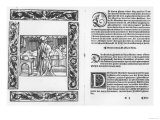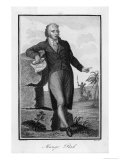|
|
|
|
|
Paracelsus, née Phillip von Hohenheim
b. 11-11-1493; near Einsiedeln, Old Swiss Confederacy
d. 9-24-1541; Austria - burned at the stake as a witch
Paracelsus, a medieval physician who offended everyone with his arrogance, was the name chosen by Phillip von Hohenheim later Philippus Theophrastus Aureolus Bombastus von Hohenheim as a title to mean 'equal to or greater than Celsus. Paracelsus, who embraced Hermeticism, a set of philosophical and religious beliefs attributed to Hermes Trismegistus and associated with magic which could be described as the manipulation of the material world, was also an alchemist and astrologer.
Paracelsus quotes ~
• “Dreams are not without meaning wherever thay may come from-from fantasy, from the elements, or from other inspiration.”
• “Medicine is not only a science; it is also an art. It does not consist of compounding pills and plasters; it deals with the very processes of life, which must be understood before they may be guided.”
• “Poison is in everything, and no thing is without poison. The dosage makes it either a poison or a remedy.”
• “We do not know it because we are fooling away our time with outward and perishing things, and are asleep in regard to that which is real within ourself.”
• “Thoughts create a new heaven, a new firmament, a new source of energy, from which new arts flow.”
Fellow Swiss Carl Gustav Jung wrote about Paracelsus in “The Spirit in Man, Art and Literature”.
|
|
|
|
Ambroise Paré
b. c. 1510; Laval, France
d. 12-20-1590; Orleans
Surgeon and anatomist Ambroise Paré is considered as one of the “fathers of surgery” for developing techniques to treat wounds on the battlefield and inventing several surgical instruments.
Ambroise Paré quotes ~
• “I dressed him, and God healed him.”
• “Cure occasionally, relieve often, console always.”
|
|
|
|
|
|
|
|
|
|
Antoine-Augustin Parmentier
b. 8-12-1737; Montdidier, France
d. 12-13-1831; Monaco
Parmentier, a pharmacist, was an advocate of the potato as an inexpensive and nutritional food that could provide relief in a famine. He also experimented with bread-baking and cheese-making as well as grain storage, mushrooms, and wine-making.
• potato prints
|
|
|
|
|
|
|
|
|
|
Ivan Petrovich Pavlov
b. 9-14-1849; Ryazan, Russia
d. 2-27-1936; Leningrad
Ivan Pavlov was a physician, physiologist and experimental psychologist. Pavlov, awarded the 1904 Nobel Prize in Physiology or Medicine for research on the digestive system, is best remembered for being the first to describe “classical conditioning” learning that involved the the salivary glands of dogs.
Pavlov quotes ~
• “It is clear to all that the animal organism is a highly complex system consisting of an almost infinite series of parts connected both with one another and, as a total complex, with the surrounding world, with which it is in a state of equilibrium.”
• “It has long been known for sure that the sight of tasty food makes a hungry man's mouth water; also lack of appetite has always been regarded as an undesirable phenomenon, from which one might conclude that appetite is essentially linked with the process of digestion.”
• Ivan Pavlov: Exploring the Animal Machine
|
|
|
previous page | top | next
health care practitioners list > a | b | c | d | e | f | g | h | i-j | k | l | m | n-o |
PA | Pe-Py | r | s | t | u-v | w | x-y-z
|
|
I have searched the web for visual, text, and manipulative curriculum support materials - teaching posters, art prints, maps, charts, calendars, books and educational toys featuring famous people, places and events - to help teachers optimize their valuable time and budget.
Browsing the subject areas at NetPosterWorks.com is a learning experience where educators can plan context rich environments while comparing prices, special discounts, framing options and shipping from educational resources.
Thank you for starting your search for inspirational, motivational, and educational posters and learning materials at NetPosterWorks.com. If you need help please contact us.
|
|
|













